RIPOSTE
by RIP RENSE |

|
(June 19, 2017)
Sgt. Pepper Summer
So many are rhapsodizing about
the new, improved “Sgt.
Pepper,” I just couldn’t join the crowd. The Internet is writhing,
contorting with think pieces (term sometimes used charitably)---about how
the album “changed the world,” “changed the face of music forever,” blah
blah blah. (Nothing about music’s arms or legs.) The use of the word,
“iconic” should carry criminal penalties. There have also, happily, been
really fine articles, notably by Jon Pareles in the New York Times---who so
correctly observed:
“We simply can’t hear “Sgt. Pepper” now the way it affected
listeners on arrival in 1967. Its innovations and quirks have been too
widely emulated, its oddities long since absorbed. Sounds that were
initially startling — the Indian instruments and phrasing of George
Harrison’s “Within You Without You,” the tape-spliced steam-organ collage of
“Being for the Benefit of Mr. Kite,” the orchestral vastnesses of “A Day in
the Life” — have taken on a patina of nostalgia. “Sgt. Pepper” and its many
musical progeny have blurred into a broader memory of “psychedelia,” a sonic
vocabulary (available to current music-makers via sampling) that provides
instant, predigested allusions to the 1960s. Meanwhile, the grand lesson of
“Sgt. Pepper” — that anything goes in the studio — has long since been taken
for granted.”
(Pareles went on to say that the album is still “guaranteed
to raise a smile.” Also correct.)
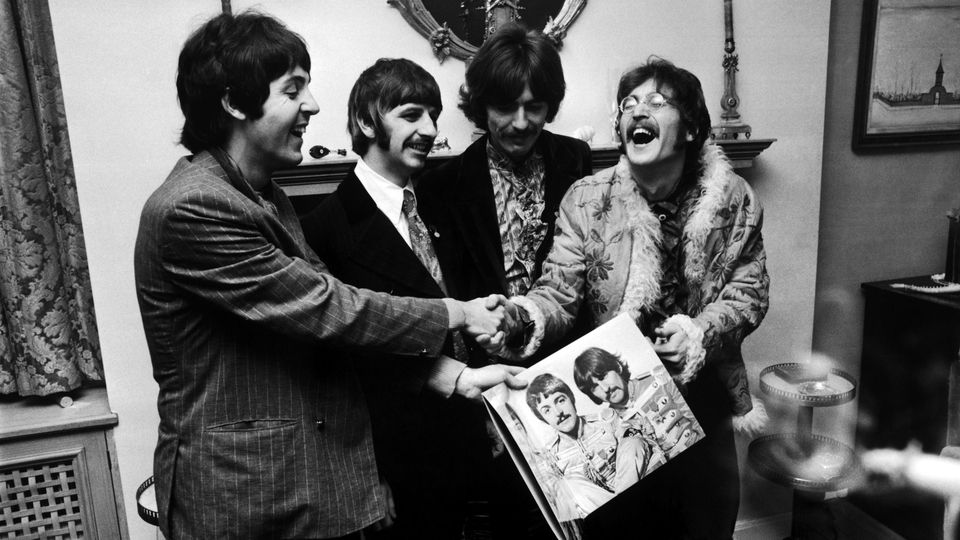 |
All the “Sgt. Pepper” anecdotes and history have been dusted off, with
stragglers of the era declaiming both obvious and incisive things. Paul
McCartney is yet again talking about Lennon adding “It can’t get no worse”
to “Getting Better” (yawn! yawn!). There have been dozens of almost
embarrassingly delighted reviews from even the most caustic and
self-important “music journalists” of the bowl-you-over new mix of the album
crafted by Giles “Son of George” Martin. (“Almost humiliatingly positive,”
is how Martin put it.) There has been chronicling of the album’s very
complicated, duly legendary, invent-as-you-go recording process, previous
stereo/mono/CD incarnations, plus more weighty matters such as whether
McCartney grew his moustache for style or to cover a car accident
scar.
What could I add? My two cents wouldn’t fatten the purse.
Yet I’ve written about The Beatles for much of my life, and am a longtime
contributing editor to the Beatles publication, Beatlefan, produced
faithfully since the ‘70’s by an affable Atlantan named Bill King.
And, yes, it is the 50th anniversary, chillingly
enough, with a new mix and outtakes. Fifty years! And I’m still here. And I
was there. I’m here, I was there, articles are everywhere. . .Therefore I
write. . .
Pareles's statement about how one can no longer hear "Pepper" as
something new---that context being so vital to appreciating the album---got
me thinking about what it was like to hear the record when it was. .
.something new. At least for me. And so, parting the mists of time. . .
I lived in a sage-scented snow globe of a country town called
Thousand Oaks, California, at that time home to maybe 18,000 people and many
more coyotes, raccoons, road runners, buzzards, rattlesnakes, poppies,
lupines, chaparral. I lived in the proverbial house on the hill, a modest
1959 affair overlooking the whole “bedroom community,” which for my purposes
was the whole world. I’d visited Law Sangeles a few times, but it
might as well have been Oz.
This was a place of bicycles and the kids on them, oak trees and
the kids in them, sun-pounded blacktop basketball courts and stuffy school
classrooms where “the girls” were privy to a whole lot of secrets that “the
boys” had no inkling of. The sky was gigantic, the days sprawled, especially
in summer, when I kicked around in cutoff jeans, stained T-shirt, Converse
All-Stars. I was gangly, I was pimply, I was thirteen. High school loomed.
I should mention that I was also fairly troubled, with every
bit as much self-worth as a tree stump, result of years of psychological
abuse by what will be termed a “malevolent presence” in my home. If I get
any more specific, I have been told that said presence will sue me. Really.
After fifty years!
One Sunday in early June of 1967, my father and stepmother
decided to drop in on one of my older brothers for a few minutes in Isla
Vista, a sleepy student hamlet adjoining idyllic, seaside University of
California, Santa Barbara. I was allowed to accompany them, never mind my
stepmother’s strange, open aversion to my having contact with my brothers.
From the back seat of the ’64 1/2 Mustang, I was shocked to see that a lot
of students living in IV had long hair, sometimes really long hair, often
with flowers in it. (My own greasy hair was clumsily policed by my
stepmother into a sort of POW look.)
Neat-o!
“Before you go, Pop,” said my brother at the end of the
perfunctory visit,“you’ve got to hear a little of the new Beatles album. You
won’t believe it. They’ve become this other group, ‘Sgt. Pepper’s Lonely
Hearts Club Band.’”
What? The idea of The Beatles having a secret identity tripped
no more than two or three million Superman comics-primed synapses. Sgt.
what? He dropped the needle on a tiny stereo inside the tiny single
apartment he shared with a roommate, and I heard the beginning of the album
for the first time.
An audience. A searing guitar. McCartney screaming, “It was
twenty years ago today, Sgt. Pepper taught the band to play,” and. . .what?
French horns? How funny. If I’d known the word, “wry,” I would have used it.
What were they up to? The act you’ve known for all these years. .
.poking fun at their Beatlemania-drenched selves, were they? Lonely Hearts?
The most pursued four men on earth? Har! Then Ringo began singing---Ringo
singing the first song on the record?---and my old man said, “Okay, got to
go.” That was it.
But that snippet of “Sgt. Pepper” followed me, as did the
beautiful, bizarre album cover that electrified every neuron in the part of
my brain handling “curiosity.” I’d never paid much attention to album covers
(except that Herb Alpert and the Tijuana Brass album with the woman
slathered in whipped cream) and compared to this new Beatles record, neither
had record companies. There were the old moptop Beatles off to the side, the
day-glo new Beatles in “hippie” military garb, soberly taking their places
among great figures of art, science, history, music, movies (including my
heroes, W.C. Fields and Laurel and Hardy). . .The colors of those burlesque
soldier uniforms: electric aqua, hot pink, a green that I didn’t know
existed in nature, neon fuchsia. Neon fuchsia? A daisy planted on top of
Lennon’s epaulet. Those weird “old lady” glasses. . .
What in the Alice had happened to The Beatles?
A couple of weeks later, a large brown UPS panel truck pulled
up outside. Screenk, thunk, and the emergency brake's
click-click-click-click cut the typical quiet of the day. I stared,
uncomprehending. You have to understand that our house was very hard to
find, at the top of a long private driveway past several other homes. The
only cars that ever showed up were ours, or people who had made a wrong turn
trying to get to a monster church built almost in our backyard. To see a UPS
truck outside was just not too far from a UFO landing. I mean, this was,
“Granny, get Jethro out of the cee-ment pond and tell him there’s a train
that ain’t got no track outside!”
But there, one searing 90-degree golden-field pre-summer
day, when I had been home alone, watching stupid morning game shows,
probably waiting to ride my bike to the high school gym or pool, was a UPS
truck. From the May Company, all the way in Law Sangeles. I told the
dog there was no need to go berserk (fell on deaf ears), and opened the
front door. A man in a brown uniform approached and asked me to sign for a
package. Sign for a package? Like they do in the movies? Me? Okay, I signed,
and a large, flat, heavy piece of cardboard was handed over.
For some reason, I dared to open it. Either curiosity
overwhelmed, or it was addressed to me, the one who would be home, I
no longer recall.
Life is funny. (You may quote me.) Only looking back are we able
to ascribe relative importance to events. I would never have believed that
the contents of the package would form a sort of pivot point in my life, let
alone society’s.
“Revolver” was on top, and there, underneath, was it:
“Sgt. Pepper’s Lonely Hearts Club Band.” I’ve never received anything with a
fraction of the thrill. Not as good as ten-foot-tall paisley aliens
tap-dancing and singing “Hello, Dolly!”, but it was close. The albums were
not intended for me, specifically, or maybe they were. It was never
explained. Stepmommie was ever looking to be au courant (the Mustang
was one of the first bought in Southern California), and The Beatles’ new
album was the talk of the world. My good fortune.
I should point out that we didn’t have many records, and
that my old man bought most of them, from opera to Caribbean steel band. I’d
prowled the new House of Sight and Sound in town on occasion, but it was
outside my reality that I might actually purchase and own a record. That was
adult stuff. Yet here were two in hand, heavy and real. I sat and stared at
both of them, reading every word available (the lyrics to "Pepper" were
printed on the back---unheard of) before proceeding.
One thing my father did right was the stereo. It was, for its
time, a monster. I slipped “Revolver” on first, because it had been done by
The Beatles first, and hell, I respected artistic integrity. I’d devoured
this arresting record while visiting my brother in Isla Vista over Easter
Vacation. His roommate had “Revolver," “Rubber Soul” and “Yesterday and
Today,” none of which I had heard before, and I played them over and over.
Also: and over. Un-toppable!
At last I put "Pepper" on the Garrard turntable, turned the
volume to seven out of ten, and, well, to quote from “Lucy in the Sky With
Diamonds,” climb in the back with your head in the clouds and you’re gone.
Alone on the top of the hill in Snow Globe Town. Me. And The Beatles.
Lend me your ears and I’ll sing you a song. . .we hope you have
enjoyed the show. . .
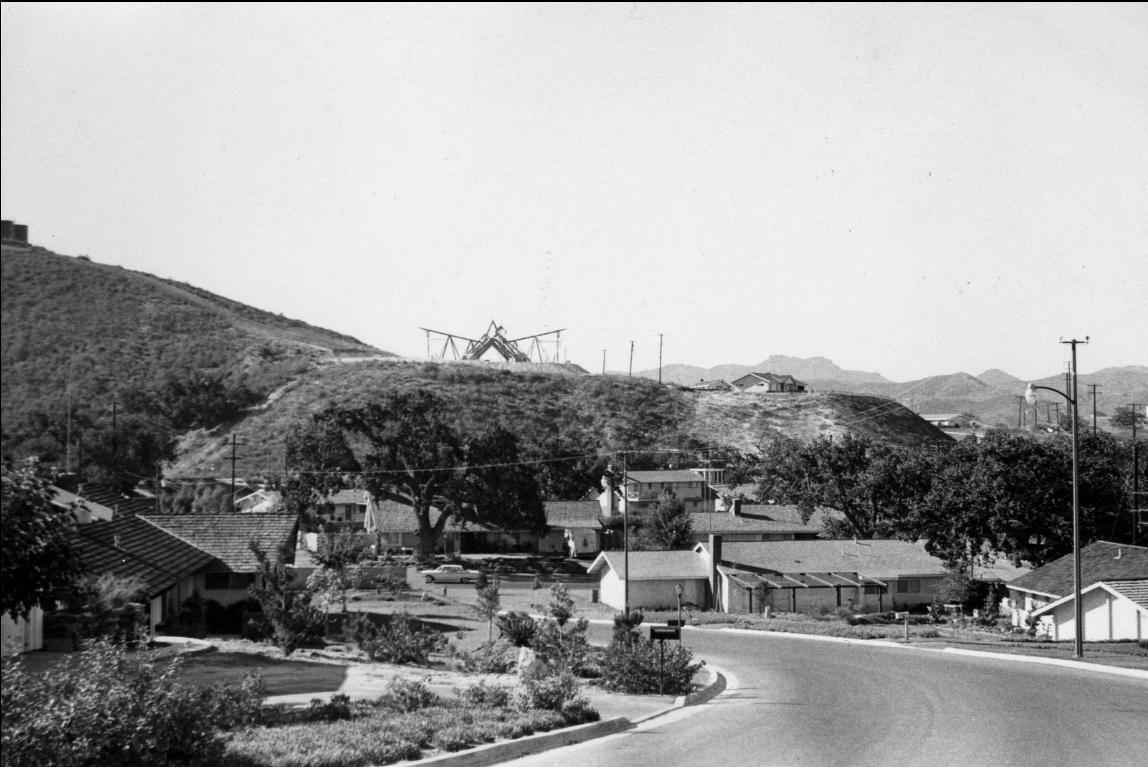
The house on the hill (right), a couple years before Sgt. Pepper Summer.
Note gigantic church under construction behind the house. (Click to
enlarge.) |
All those recently analyzing
the album’s greatness, comparing it with other Beatles albums (yawn),
asserting that the songs are trifles (gawd). . .just tragic. Talk about
missing the point. Talk about not seeing the forest for the tangerine trees.
. .This was a scintillating, sparkling, stunning, wholly unexpected message
of goodness, invention, exuberance, joyfulness, color, élan. A telegram from
possibility. Newness. It zinged and exploded and twinkled and roared. It
ruminated and brooded and dreamed and chuckled and wept and existentially
mused (though I only intuitively knew what existential musing was at the
time.) Small wonder they had spent five or six months recording it.
I mean, what were the instruments that could produce such
sounds? I had no idea whatsoever---no idea that The Beatles had almost
miraculously developed their own new orchestral and musical language of
harpsichords, organs, backwards tapes, altered voices, augmented pianos,
oom-pah bands, music hall combos, muffled drums, paper-covered-combs, bass
harmonicas, other-worldly things called sitars, tambouras, tablas,
swarmandals.
And the
imagery! Plasticene porters with looking glass ties. . .4000 holes in
Blackburn, Lancashire. . .everyone you see is half-asleep, and you’re on
your own, you’re in the street. . .I used to be cruel to my woman, I beat
her and kept her apart from the things that she loved. . .She goes
downstairs to the kitchen clutching a handkerchief. . .And of course,
Henry the Horse dances the waltz. . .
It was the musical equivalent of a kid kicking clods in 1890
Salina, Kansas when his first circus came to town. This was such a profound
Great Leap Forward, even from the experiments of “Revolver.” So much depth,
so much texture, so much detail, so many new sounds, orchestrations, layers;
not a moment devoid of sheer, riveting vivacity, invention. Songs fairly
exploded out of the speakers with whimsy, laughter (sometimes literally),
flights of fancy, poignancy, campiness, reassurance, disassociation, musing,
reflection, contemplation, touches of irony.
These were Beatles? These were yeah yeah yeah
Beatles? These were the pot-smoky folkies of “Rubber Soul?” The
backwards-tape explorers of “Revolver?” Yes, these were Beatles. Wizard
genius Beatles from Beatitude. By way of Wonderland.
Consider “Within You Without You” alone. The song froze me in
the overstuffed living room chair, not just for its transfixing, eerie
melodies, but for the philosophizing. Who knew that Harrison was actually a
thousand-year-old yogi? I sat, wide-eyed, listening to things that I also
felt, even at that age, though could never have articulated. We were
talking about the space between us all / and the people who hide themselves
behind a wall of illusion / never glimpse the truth. . . We were talking
about the love that's gone so cold / and the people who gain the world and
lose their soul / they don't know, they can't see, are you one of them?
This guy knew. The truths in that song are as fresh
and profound today, and even more urgent. What an epiphanal moment was this
for young George (small wonder Lennon thought it was the best thing he’d
ever done.) Realizations so succinctly, poetically put, the melodies so
original, ethereal, somehow almost. . .ancient. Geese walked on my arms
during the line, “And you’ll see you’re only very small and life goes on
within you and without you.” (Decades later, when I sat down to interview
Harrison, I was almost too tongue-tied to speak. This is the guy who wrote
“Within You Without You,” my brain kept headlining.)
And then, "When I'm Sixty-Four?" Some juxtaposition. Who
knew that McCartney was actually a '20's dance hall bandleader? (The song
was one of the first he ever wrote as a kid, certainly influenced by the
taste of his dad, who was a '20's dance hall bandleader.) McCartney's
presence was heroic throughout the record, from the "Sgt. Pepper" opening to
the (acid-inspired) declaration of independence, "Fixing a Hole" (with
harpsichord, of all things, as the defining instrument), to the tender,
poignant "She's Leaving Home" (scored for harp and strings!) to the wacky,
mildly pornographic anthem, "Lovely Rita," a love song to a parking cop (!).
Not to mention his keyboard part on “Lucy in the Sky With Diamonds,” his
coaching of Lennon’s vocal in “Being for the Benefit of Mr. Kite,” his
astoundingly lyrical bass parts that were themes unto themselves. . .
Speaking of
"Mr. Kite," to quote the Jabberwock, "O, frabjous day" it was when Lennon
told George Martin he wanted to "smell the sawdust" and "taste the
atmosphere" of a circus, and create "swirly" music. Lennon trusted Martin's
invention, as he did on "Strawberry Fields," and later on "I am the Walrus,"
and the delegating paid off. What we now know as tapes of calliopes and
Sousa marches cut up, thrown in in the air, and patched together
willy-nilly, was just the most frabjous stuff anyone could have
wanted, and the most frabjous music I'd ever heard. I mean, it really
"came whiffling through the tulgey wood." You could see this music, in
shards and swoops and glitter and gurgle and a ton of what-was-that?,
tumbling out of the speakers and yes, swirling, through the room.
"A Day in the Life?"
Well, gasp. The laconic, dreamy Lennon poetry of
it, bracketed by the rather frightening suggestion, "I'd love to turn you
on," an utterance so controversial then as to be banned from radio. The
Varese-like orchestral cataclysm the followed, and that ended the
proceedings (McCartney’s idea), well, what in the world was it? A cliche
today, thank you popular culture, but earthshattering, skull-stunning then. The Bomb? The void?
The answer? To my ears, trained on classical radio, the part where Lennon's
disembodied voice floats around after McCartney's brilliant "middle eight,"
eventually transforming (via George Martin) into a massive, almost Wagnerian
orchestral climax, well, that was the stuff.
And yeah, I'm sure I was among hundreds of thousands (millions?)
who cranked up Ringo's big fat four-four drumbeat coming right after all
those different animals appeared, chewing up and swallowing the remains of
Lennon's ironic "Good Morning Good Morning." One. . .two. . .three. .
.four. . . ((It hadn't been funny enough to just have a rooster crowing
on the thing, a la the Kellogg's Corn Flakes box, you see.))
This was
not just another collection of Beatles songs. This was a work, an opus, a de
facto suite. The same ethos, the same priorities, applied to every minute on
the disc: experiment, let the limits of thinking be the limits. It was all
one splendid, uncontrived, unjaded idea, or perhaps better to say, idealism.
I played "Sgt. Pepper” daily. If no one was home, several
times. I eventually played it every morning before school that fall, at
volume so low that only I and my dog could hear it (yet prompting my
stepmother to emerge from her bedroom, telling me to turn it off, hissing
“Why are you listening to that!”) Yes, “Sgt. Pepper” was a badly needed
injection of good stuff at a time when I needed it, but more than
that, it was suffused with an implied message: nothing need be drab,
predictable, rote, suppressed, oppressed. Imagination, freedom, are
all. Wear neon fuchsia, at least in your mind.
Later that summer, the so-called “Summer of Love,” I was so
lucky to go back to Isla Vista. Alone. My stepmother protested to my father,
“He’ll just think he’s back home with his brothers,” but the old man sent
me, anyhow, probably figuring it was good for all concerned. Both my
brothers indeed lived in I.V. at the time, and to be reunited with them was
sheer heaven, as my stepmother had apparently feared. I mean, they liked
me.
The heaven metaphor, by the way, extended to the general
surroundings. . .
All up and down the tar-smelly I.V. beach, all up and down the
flowery, succulent stuffed, brine-perfumed little streets, under the shaggy
old eucalyptus and Torrey pines (and sometimes living in them), were
hippies. Today, that conjures all sorts of ridiculous stereotypes, of
course, but to me, these were just nice people---the nicest I had ever
encountered, in fact. They were quiet, soft-spoken, gentle, approachable---UCSB
students, for the most part. They lived in cheap rooms and read mountains of
books and smoked mountains of dope (which did not contain brain-freezing
levels of THC in those days.) They wore wonderful amalgams of patterned
India gauze, Guatemalan print shirts, bell bottom jeans augmented with
hand-stitched paisley hems, bandanas, panchos, Guayabera shirts, huarache
sandals, flowing skirts. They streamed nightly to the edges of the cliffs,
patchouli in their wake, to silently watch the sun collapse, or fade, or
melt, or go phantasmagoric into the smooth Pacific. And everywhere I walked
in Isla Vista, at all times of day and well into the night, in fog and in
sun, they were listening to “Sgt. Pepper.” It was almost never, never out of
earshot, here from an apartment, there from a house. The Beatles were all
around, everywhere you went, with that twinkly, sparkly, unadulterated,
revolutionary exuberance.
|
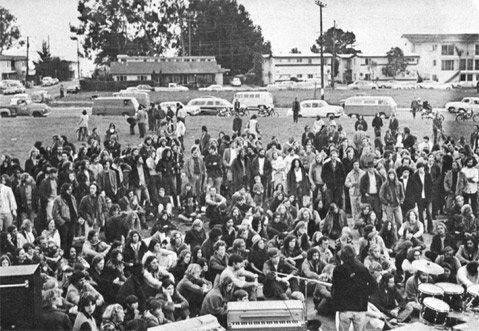 |
 |
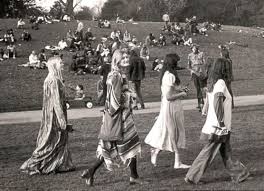  |
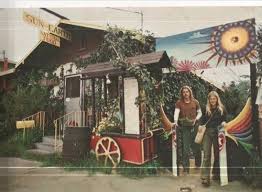  |
Isla Vista in the '60's, or approximations thereof.
 |
It was against this Sgt. Pepper
Summer backdrop that something, well, it’s hard to find the words
for it. How to describe the feeling of a rescued dog treated with care,
kindness, love for the first time? Perhaps that’s too dramatic, but I'll
stick with the analogy. Some of these “hippies,” these nice people,
went out of their way to be kind to my wretched, introverted being that
summer, to not dismiss my opinions, but solicit them, to not force me to
stay in my room, but to take me for walks on the beach. . .to. . .make me
feel like a human being. It didn’t take much. You want to be a writer?
What kinds of things do you write? What kind of music do you like? Have you
read this book? Here, take it. You like Steinbeck? Good morning, Ripper. . .
Then there was my oldest brother’s house, where I stayed. This
was a faded pink, ‘20’s-vintage, knotty pine-paneled rambling series of
funky rooms planted on the cliff above the sea, right beside the
sunset-viewing vacant lot. The lone walkway down to the beach was also
outside, with its steady trickle of surfers, dogs, bikinis, acid-trippers
staring at oranges. The doors of this unassuming enclave, this free-spirit
retreat, were usually left wide open, the floors creaked endearingly when
you walked, and ever-new batches of kittens scampered and hid. At night,
branches of the giant cedar in the backyard caressed the roof, shoosh
shoosh, and the dull thunk of the breakers below put you to sleep.
Magic.
I
walked on the beach a lot, both with with my brother and alone, collecting
tons of shells (which I still have, in the same brown bag I first put them
in.) One of my brother’s girlfriends and her kid sister (my age!) walked
with me one day, asked me about myself, and so on. They were not repulsed!
They accepted me, zits and all. Would you believe in a love at first
sight? Yes, I’m certain that it happens all the time. I was over the
moon in love with both of them, of course. . .
No one had really done these things before,
understand, not that I can recall.
Quite to the contrary, I had long been made to feel that my thoughts,
ambitions, feelings were wrong, stupid, of no importance or interest. To be
treated so decently, I now realize, planted the seeds of resolve to tolerate
nothing less. . .
As did The Beatles:
Something inside that was always denied for so many
years. . .Holding me down / Turning me 'round / Filling me up with your
rules. . .You gave me the word / I finally heard. . . A little better all
the time (It can't get no worse). . .
It wasn't overt, of course, it was subliminal,
a suggestion. I didn't relate
these words directly to my life; they slipped in among my neurons and cajoled my
subconscious. What was overt, an injection of wonder and inspiration equal
in impact to "Pepper," was my oldest brother introducing me to
Beethoven’s 9th Symphony, the “Ode to Joy.” As I sat, listening
to it on his massive speakers (appropriated during the redesign of a local
theater), I copied down the
words from the album notes so I could sing along in German. Alle
Menschen werden Bruder wo dein sanfter flugel weilt. . .All men are
brothers under the protective wing of joy. . .
“Sgt. Pepper”. . .“Ode to Joy,” the hippies, and The Beatles in
the air.
I get by with a little help from my friends. . .I’ve got
nothing to say but it’s okay. . .And it really doesn’t matter, if I’m wrong
I’m right, where I belong I’m right. . .We were talking about the space
between us all and the people who hide themselves behind a wall of illusion.
. .. . .Freude schooner Gotterfunken, Tochter aus Elysium. . .
And so did these fellows on the other side of the world---these
musical conjurers lit from within---and their producer and engineer, create
a kind of zeitgeist, catharsis, that touched the lives of millions, and the
culture at large. And me.
Sgt. Pepper Summer it was.
In years to come, I played the album into such familiarity that
I eventually wore it out, finally listening no more than once a year in a
kind of failing effort to keep it fresh. For everyone had originally figured
that “If this is what the Beatles did this time, imagine what’s coming
next.” Well, there was great music to come, but the end of the sonic alchemy
came all too soon, and all too sadly. There was nothing afterward that
matched---that could have, or perhaps should have matched---the electricity
and breakthrough of “Pepper.”
Yes, I bought
the new 2017 mix of the album, this fresh realizing of the old tapes, with
technology more matched to the sophistication of the original music and
vision. It arrives, as did the original “Pepper,” at a troubled time in the
world, though today’s troubles are exponentially worse than Vietnam and
civil rights. The entire ecosystem is imperiled by aspects of human behavior
that are as far away from the inventive spirit that infuses “Sgt. Pepper” as
can possibly be. It's almost as if “Sgt. Pepper’s Lonely Hearts Club Band,”
in all its new, vastly larger clarity, volume, depth, detail, color, has
come back to shout possibility and joy to all the hearts made
so lonely by the exponentially greater cynicism, malice, unconscionable
greed, brutishness, evil rampaging the world over. We were talking about
the love we all could share / when we find it / to try our best to hold it
there / with our love, we could save the world / if they only knew. . .
Of course, few will see it that way. Most are simply enjoying
the oomph of the new realization, (especially Ringo, whose drums are
at last big and full), or are busy debating the album's "greatness" (while
being largely oblivious to its. . .greatness.)
For me, "Sgt.
Pepper Summer," or ghost of same, has returned; a bittersweet echo, a
lovely, unexpected visit from a very old and important friend I never
expected to see again. I’ve got nothing to say but it’s okay.
BACK TO PAGE ONE |
![]() Riposte Archive
Riposte Archive